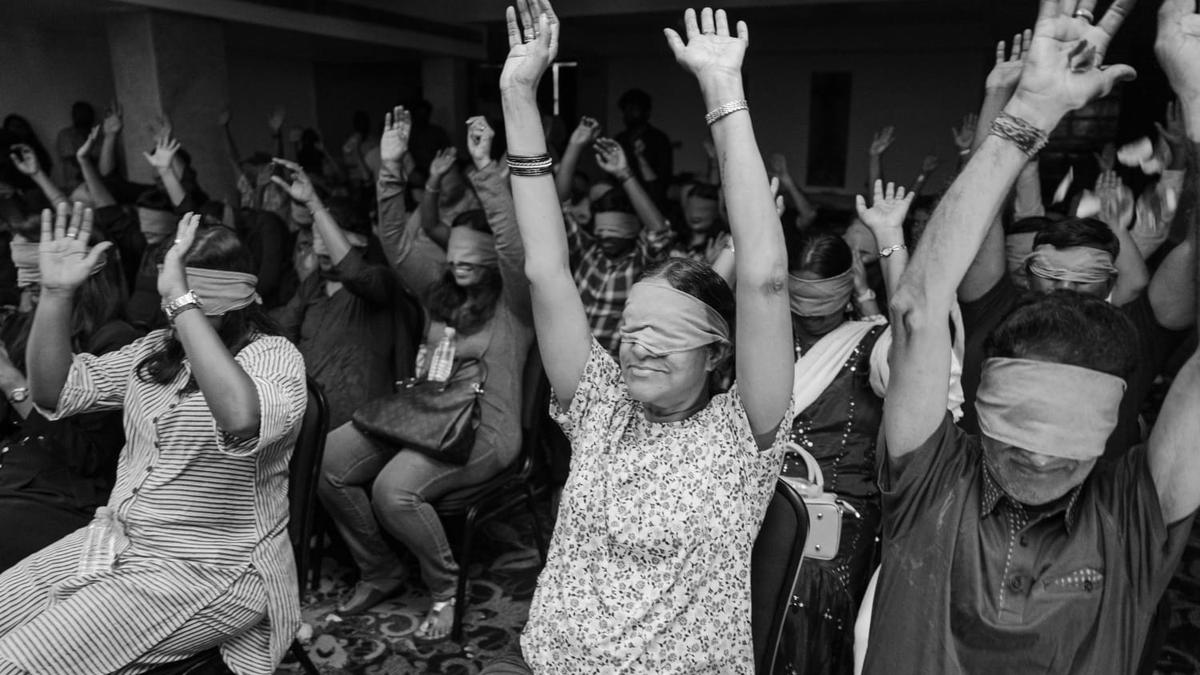
Ever watched a play blindfolded? Chennai’s Evam experiments with sensory fantasy theatre
The Hindu
Chennai played host to theatre of the mind with Evam’s well-executed, experiential fantasy show for a blindfolded audience
As soon as the blindfolds come on, a nebulous mass of anxiety and excitement parks itself in my head. Where do I go, what or whom do I hold on to, what if I fall on my face?…before the questions can multiply, an outstretched hand finds and guides me to safety — a stationary chair. I am now one of the 75 blindfolded people seated to “watch” a play through every other sense except sight. I immediately start searching for a familiar hand [of the friend who accompanied me] and demand that I be seated next to her. Phew, all is well. And so begins The Most Fantastic Show that You Cant See.
A novel, immersive piece of theatre, Evam’s latest, in association with The Savera Hotel and the National Association for Blind (NAB), was an experiment that went surprisingly well considering the many movable parts that made up this format.
The first brush of movement was a rabbit (a plush toy that was perhaps grazed against my leg) that ran across my leg, and a ‘big sneeze’ that covered me in an unexpected shower. Shortly after, guided by the narrator’s (Nithin Ram) resounding voice, we were introduced to Princess Why (an obvious call back to Mahasweta Devi’s famed Why Why Girl),who whispered, bellowed, sang and danced around us. The story followed this very princess, who refused to stop asking questions.
The descriptive narration was dotted with sensory theatre, comprising acts like having to raise our hands to receive a sweet treat: maybe a date or a cupcake. Strong notes of vanilla wafted through the air, an olfactory treat, in preparation for what was about to be tasted. We were apprehensive , but nudged by the reassuring narrator, the vanilla cupcake was finally consumed. “Hmmm,” my friend approved, while taking a bite.
Setting the play in a fantastical world that had an intriguing mix of the whimsy of Dahl and the gravitas of Devi, meant more imagination, and food for thought. The audience rightly created a world in their heads, making an experience like this tailored for each mind. This encompassed the beauty of this showcase: itheavily relied on each induvidual’s interpretation, which in turn, is influenced by their own conditioning.
Though the play took a fantastical route to tell a story of empowerment, the narrative at times struggled to reach beyond ṭhe obvious tropes.
In the garb of an all-out entertainer, the show also made the audience reflect on the collective privilege we enjoy as people with sight. Right from the terrifying, guided walk towards our seat, to when the show ends, you are reminded of your privilege, and the show makes you empathise with the visually-impaired. .

In a study published in the journal Mammalian Biology on December 23, 2024, researchers compared the calls of Asian elephants based on their age, sex, and behaviour. They found the duration of trumpets remained fairly consistent across all age classes for both male and female Asian elephants but roars and roar-rumbles got longer with age.












